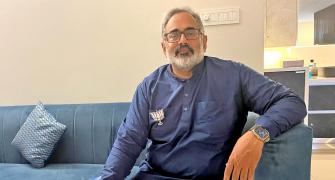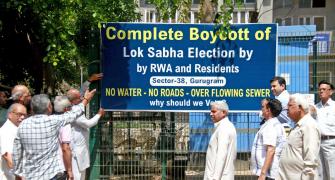Surrounded by door handles and light fixtures in his small builders' interiors shop, Praveen Khandelwal reels off the many reasons why he opposes plans for a value-added tax.
Some of his objections are practical, others technical. Above all, he is worried that a new tax will mean a new payoff to bureaucrats and tax collectors he says are thoroughly corrupt.
"The government should reform their own departments before putting the finger on us. Corruption is there at every level.
"We're afraid of the system, we're not afraid of the tax. Traders are ready to pay any amount but it must be properly prepared," said Khandelwal, who is also general-secretary of the Confederation of All India Traders.
No one likes to pay extra tax, but the government's struggle to overcome the objections of Khandelwal and millions of other traders is crucial: the value-added tax is the centrepiece of a drive to reform the tax system and raise the revenues needed to stabilise India's soaring public debt and alleviate poverty.
The VAT, with a standard rate of 12.5 per cent, should have taken effect on April 1 but was delayed because most of India's 28 states were not ready. Since then, ministers have faced down a nationwide strike by truckers whose grievances included the new tax and have sought to allay concerns by raising the turnover threshold at which VAT kicks in.
The new date for the tax to be introduced is June 1, but few would be surprised by further delays.
"As of now I am confident, but in such matters confidence must be tempered by caution," said N K Singh, a senior member of India's Planning Commission. "There will be daunting issues but we must make a credible beginning sooner rather than later."
Litmus test
The VAT could well reduce revenues at first because it is supposed to replace a web of state-level sales taxes.
But its real importance is as a litmus test of New Delhi's determination to create a modern tax system that brings many fast-growing services that are currently untaxed, as well as the large but unorganised retail sector, into the revenue net.
In the words of the government's latest Economic Survey, the goal is a "minimum interface between the assessee and the tax official" -- in plain English, making it harder for traders and others to dodge tax by slipping a bribe to the local taxman.
"The moment you have a VAT, which is a multi-point tax, at some point of time they (traders) will come into the tax net and they don't want that," said Govinda Rao, director of the National Institute of Public Finance and Policy.
"At the end of the day, tax revenue improvements is a question of political will, and we don't have the stomach."
A glance at the public finances shows the urgency of reform.
The general government deficit is projected to exceed 11 per cent of India's gross domestic product this year, higher than the shortfall of 9.4 per cent in fiscal 1990-91, when India embarked on its first wave of market-opening
Interest payments alone make up half of central government spending. Despite adopting market prices for oil, on-budget subsidies this year will be double the level of 2000-01.
Add in salaries, defence spending and mandatory transfers to the states and D. Swarup, a top finance ministry official, says ministers have less than 10 per cent of the budget to juggle on health, education and other services for India's one billion people, a quarter of whom live below the poverty line.
Grim reading
The revenue side of the equation is also grim. General government tax receipts are less than 16 per cent of GDP, barely higher than in the early 1990s. The take of indirect taxes in particular has disappointed -- one more reason for the VAT push.
Despite the dire figures, which prompted Standard and Poor's last September to downgrade India's local-currency debt ratings to junk status, it is hard to find anyone inside or outside government who believes India is heading for a financial crisis.
With capital controls keeping money at home and gun-shy banks holding some 36 per cent of their assets in government bonds, the government can easily fund its debt. And a big invisibles surplus means the deficit does not lead to balance-of-payments strains.
Indeed, with nominal GDP growth handily outstripping interest rates, which have fallen by half since the mid-1990s, some officials say India's debt dynamics are improving despite gaping holes in state budgets. Deutsche Bank estimates the combined debt of the states and central government at 69 per cent of GDP.
"As far as the fiscal situation is concerned, the worst is over," said Vijay Kelkar, a senior finance ministry adviser.
Perhaps, but only by slashing its current spending can the government hope to generate the rise in domestic savings of about six per centage points of GDP required to boost investment to the levels needed to achieve its growth goal of eight per cent a year.
Instead, with an election looming next year, Finance Minister Jaswant Singh delivered a budget last month that was widely criticised for proliferating tax exemptions.
"It is a failure of politics. The political class in this country doesn't recognise that money doesn't grow on trees," said Manmohan Singh, who launched India's economy on the road to liberalisation when he was finance minister from 1991-96.
Singh, who now leads the opposition Congress party in the upper house of parliament, doesn't hesitate when asked what his priority would be if he had his old job back -- modernising India's tax administration. Stricter compliance is crucial in order to collect more revenue without raising rates, he says.
"This is not something glamorous and it doesn't generate any headlines, but it's something all administrations have paid too little attention to," Singh said.







